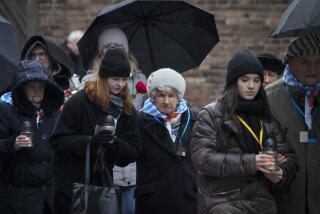Katyn: Joy and Sorrow in Poland : War crimes: Moscow’s admission of guilt in the 1940 massacre brings tears to those who remember.
- Share via
WARSAW — For nearly nine years, through deportation from her native Poland and war’s devastation, Helena Krahelska kept her husband’s shoes and shirts waiting.
But in 1948, she acknowledged that her beloved Piotr must have been among the Polish army officers massacred early in World War II by the Soviets in Katyn Forest in the western Soviet Union.
It took the Soviet government 42 more years to do the same.
The massacre of thousands of Polish officers has seared the national consciousness for 50 years. On Friday, Poles received Moscow’s official acknowledgement that Josef Stalin’s secret police were responsible.
A statement and apology by the official Soviet news agency Tass reversed decades of insistence that the Nazis murdered 4,000 Polish officers. The bodies of 11,000 others were never found; Tass referred to these soldiers as having disappeared.
“I regret that my mother could not live until this day,” said a tearful Wanda Zadrozna, Krahelska’s daughter. “There is a great regret that it took 50 years and the wives of those people didn’t live until this day. But whatever happens now, it is good that the truth will be finally written in history.”
The Tass statement came during a three-day Soviet visit by Polish President Wojciech Jaruzelski. Jaruzelski met with Soviet President Mikhail S. Gorbachev and planned to visit Katyn today.
In Warsaw, Poland acknowledged Moscow’s admission, but demanded clarification of other “blank spots” in the two countries’ history.
“The Soviet admission of the crime committed on the Polish officers in Katyn was long-awaited. The event which took place 50 years ago in the woods near Smolensk painfully overshadowed relations between our two nations,” a government statement said.
But it added: “Reconciliation can only be built on truth. Acknowledging the importance of the official statement by the Soviet side, we expect clarification of all so-called blank spots in our common history, of which the symbol for us Poles was the Katyn massacre.”
In London, the British government welcomed Moscow’s admission. Foreign Secretary Douglas Hurd said the “terrible things” that Stalin did cannot be forgotten.
“It’s good that criminals admit their crimes,” Solidarity leader Lech Walesa said in Gdansk. Walesa called the Soviet admission “an act of moral justice which has been awaited for a long time.”
He said there must also be “punishment of those guilty of the genocide,” reparations stemming from the Soviet occupation of eastern Poland in 1939 and free access to Soviet territory that is “emotionally important” for Poles.
“I feel a great joy now that after so many years the truth has been revealed,” said Bozena Lojek, whose father-in-law died at Katyn. “For us, it is a great success,” and will lead to “many political and economic consequences.”
For Zadrozna, who was 12 when she last saw her father, the memories cut deep.
“We got three letters, the last one was from March 5, 1940,” Zadrozna recalled. “Then no one got any letters any more.”
While Poland’s Communist governments echoed the Soviet explanation that the Nazis were to blame, most historians concluded that the massacre was committed by Stalin’s secret police in late April and early May, 1940.
“We have been missing those people for so many years,” Zadrozna said. “They were not ordinary people. They were people of science, good, wise people and, unfortunately, nothing can make up for this loss.”
More to Read
Sign up for Essential California
The most important California stories and recommendations in your inbox every morning.
You may occasionally receive promotional content from the Los Angeles Times.













